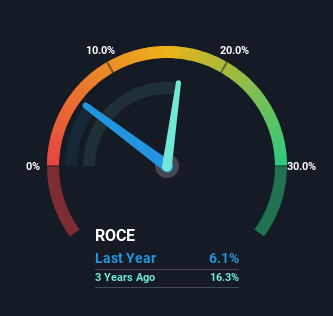- Germany
- /
- Paper and Forestry Products
- /
- XTRA:DLX
Capital Allocation Trends At Delignit (ETR:DLX) Aren't Ideal
If we want to find a potential multi-bagger, often there are underlying trends that can provide clues. Ideally, a business will show two trends; firstly a growing return on capital employed (ROCE) and secondly, an increasing amount of capital employed. Basically this means that a company has profitable initiatives that it can continue to reinvest in, which is a trait of a compounding machine. Although, when we looked at Delignit (ETR:DLX), it didn't seem to tick all of these boxes.
Return On Capital Employed (ROCE): What Is It?
For those who don't know, ROCE is a measure of a company's yearly pre-tax profit (its return), relative to the capital employed in the business. The formula for this calculation on Delignit is:
Return on Capital Employed = Earnings Before Interest and Tax (EBIT) ÷ (Total Assets - Current Liabilities)
0.061 = €2.5m ÷ (€50m - €8.5m) (Based on the trailing twelve months to June 2024).
Therefore, Delignit has an ROCE of 6.1%. On its own that's a low return on capital but it's in line with the industry's average returns of 6.3%.
Check out our latest analysis for Delignit

Above you can see how the current ROCE for Delignit compares to its prior returns on capital, but there's only so much you can tell from the past. If you're interested, you can view the analysts predictions in our free analyst report for Delignit .
So How Is Delignit's ROCE Trending?
On the surface, the trend of ROCE at Delignit doesn't inspire confidence. Around five years ago the returns on capital were 8.0%, but since then they've fallen to 6.1%. Given the business is employing more capital while revenue has slipped, this is a bit concerning. This could mean that the business is losing its competitive advantage or market share, because while more money is being put into ventures, it's actually producing a lower return - "less bang for their buck" per se.
On a side note, Delignit has done well to pay down its current liabilities to 17% of total assets. So we could link some of this to the decrease in ROCE. What's more, this can reduce some aspects of risk to the business because now the company's suppliers or short-term creditors are funding less of its operations. Since the business is basically funding more of its operations with it's own money, you could argue this has made the business less efficient at generating ROCE.
Our Take On Delignit's ROCE
In summary, we're somewhat concerned by Delignit's diminishing returns on increasing amounts of capital. It should come as no surprise then that the stock has fallen 37% over the last five years, so it looks like investors are recognizing these changes. Unless there is a shift to a more positive trajectory in these metrics, we would look elsewhere.
If you'd like to know about the risks facing Delignit, we've discovered 4 warning signs that you should be aware of.
While Delignit may not currently earn the highest returns, we've compiled a list of companies that currently earn more than 25% return on equity. Check out this free list here.
New: Manage All Your Stock Portfolios in One Place
We've created the ultimate portfolio companion for stock investors, and it's free.
• Connect an unlimited number of Portfolios and see your total in one currency
• Be alerted to new Warning Signs or Risks via email or mobile
• Track the Fair Value of your stocks
Have feedback on this article? Concerned about the content? Get in touch with us directly. Alternatively, email editorial-team (at) simplywallst.com.
This article by Simply Wall St is general in nature. We provide commentary based on historical data and analyst forecasts only using an unbiased methodology and our articles are not intended to be financial advice. It does not constitute a recommendation to buy or sell any stock, and does not take account of your objectives, or your financial situation. We aim to bring you long-term focused analysis driven by fundamental data. Note that our analysis may not factor in the latest price-sensitive company announcements or qualitative material. Simply Wall St has no position in any stocks mentioned.
About XTRA:DLX
Delignit
Engages in the development, production, and sale of ecological materials and system solutions in Germany.
Flawless balance sheet with reasonable growth potential.
Market Insights
Community Narratives



